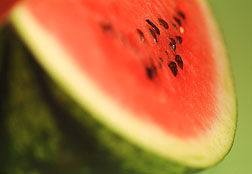This page has been archived and is being provided for reference purposes only. The page is no longer being updated, and therefore, links on the page may be invalid.
|
|
Tracking Virus Resistance Genes in Watermelon Made Easier with New Molecular Markers
By Stephanie YaoDecember 28, 2009
Finding watermelon genes that confer resistance to the devastating zucchini yellow mosaic virus (ZYMV) has just been made easier, thanks to molecular markers developed by Agricultural Research Service (ARS) scientists and university and international cooperators.
ZYMV, a member of the Potyvirus family, seriously affects the commercial production of cucurbit crops like watermelon worldwide. Potyviruses are the largest of the 34 plant virus families currently recognized, most of which are transmitted by aphids. Cucurbit plants infected with ZYMV lose their ability to photosynthesize, resulting in yellow mosaic on leaves, stunted plant growth, unmarketable and deformed fruit, or even early plant death.
In the United States, spraying watermelon fields with insecticides is the most common practice to reduce the presence of aphids that spread the virus. Still, the development of commercial varieties that are resistant to the virus is the most economic and effective method for controlling the disease.
ARS plant virologist Kai-Shu Ling and geneticist Amnon Levi, with the agency's U.S. Vegetable Laboratory in Charleston, S.C.; geneticist Karen Harris, now with the ARS Crop Genetics and Breeding Research Unit in Tifton, Ga.; and geneticist Michael Havey, with the ARS Vegetable Crops Research Unit in Madison, Wis., collaborated with scientists in France and at North Carolina State University to sequence and clone a gene called eukaryotic translation initiation factor 4E (eIF4E), which the scientists believe confers resistance to ZYMV in watermelon.
The scientists have also identified single nucleotide polymorphisms (SNPs, pronounced "snips") that are potentially responsible for resistance to ZYMV in watermelon. SNPs are variations in DNA sequences that can affect protein sequence and functions and, in this case, how a plant responds to ZYMV.
Based on these SNPs mutations, two molecular markers, named CAPS-1 and CAPS-2, have been developed to help facilitate watermelon breeding through marker-assisted selections. Currently, advanced watermelon breeding lines with resistance to ZYMV are under development at the ARS Charleston laboratory for future public releases.
Details of this study, which was partially funded by the U.S. Department of Agriculture's (USDA) National Institute of Food and Agriculture (NIFA), can be found in the scientific journal Theoretical and Applied Genetics.
ARS is USDA's principal intramural scientific research agency. The research supports the USDA priority of promoting international food security.

